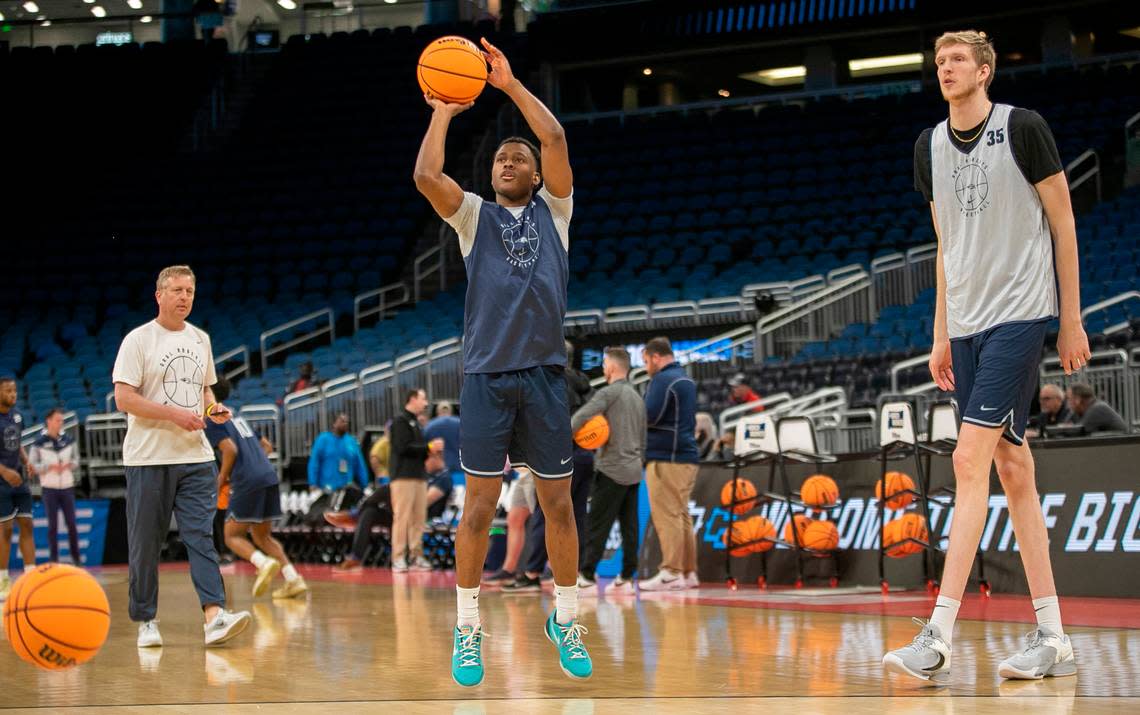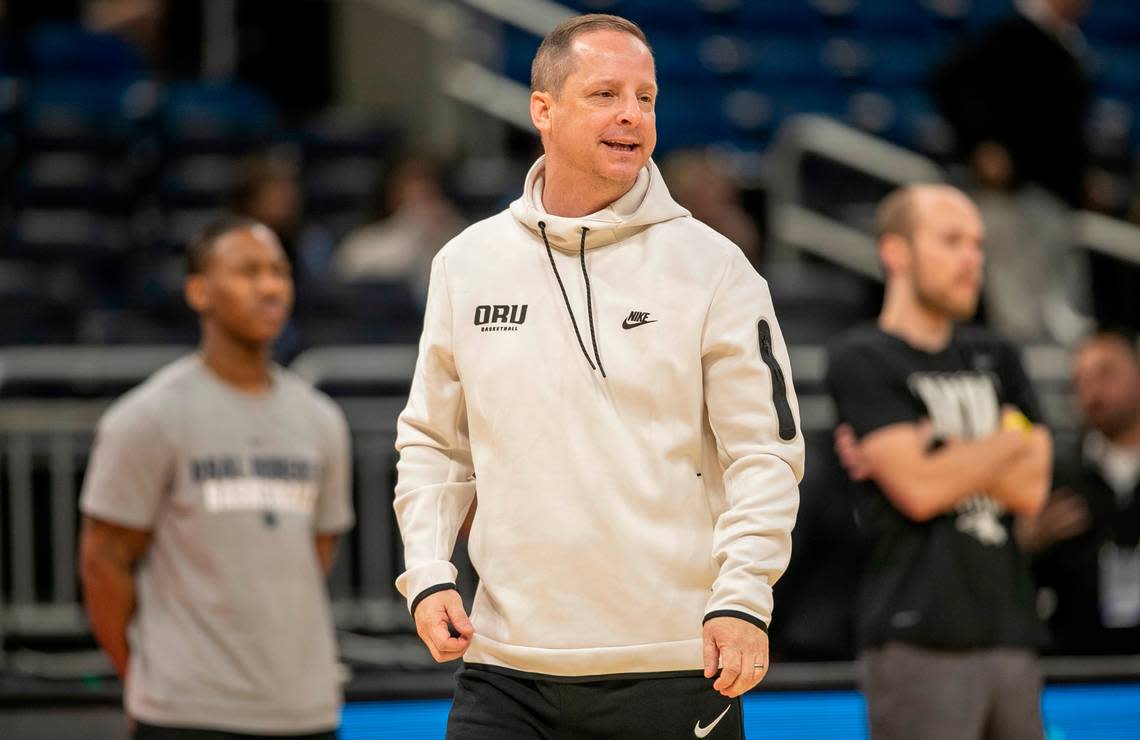As Oral Roberts seeks to again become March Cinderella, larger mission remains controversial
The first time Kareem Thompson read Oral Roberts University’s Honor Code Pledge, it did indeed strike him as “a lot” as he described it with a laugh here on Wednesday. The pledge, which every Oral Roberts student agrees to uphold “prayerfully and carefully,” commands those who sign it “to use the full powers of (their) mind for the glory of God.”
Students PLEDGE, in capital letters, as it goes in the document, “to grow in my spirit, by developing my own relationship with God” and “to to earnestly strive to manifest God’s love to others by following Christ’s example to do unto others as I would have them do unto me.”
Then there’s everything else: No drugs. No drinking. No smoking.
No “illicit, unscriptural sexual acts, which include any homosexual activity and sexual intercourse with one who is not my spouse through traditional marriage of one man and one woman.”
“Reading it, I was like, man, there’s a lot more to this I didn’t know, at first,” said Thompson, a 6-5 senior guard on the Oral Roberts basketball team. “But it was nothing too crazy.”
Thompson and his teammates arrived here on Tuesday for the NCAA Tournament as the No. 12 seed in the East Region. The Golden Eagles, who play against fifth-seeded Duke on Thursday night, are seeking to replicate or exceed their run of a couple years ago, when they reached a regional semifinal.
In 2021, Oral Roberts became one of those stereotypical feel-good Cinderella stories of March, one of a plucky underdog making good; one of a small school defying the odds and defeating schools with bigger names and brands and considerably larger budgets. Two years ago, the 15th-seeded Golden Eagles beat Ohio State and Florida on the way to the Sweet 16, and then lost by only two against Arkansas in the the South Regional semifinal.
This year, Oral Roberts is even better. It enters the tournament with the nation’s longest winning streak, at 17 games. Its 30 victories have set a school record. It didn’t lose once in the Summit League, and advanced to the tournament with a 34-point victory in its conference championship game. The university does not sponsor football, so its men’s basketball team has become its most visible asset, an ambassador for what it represents.
‘Basketball keeps me occupied’
And what Oral Roberts represents, to its critics, are attitudes of intolerance and exclusion; a place where not all are welcome. There was an irony to Oral Roberts’ arrival on Wednesday at the Amway Center where, on video boards outside, the Orlando Magic advertised Pride Night, scheduled for later this month.
Inside their locker room on Wednesday, the Golden Eagles side-stepped questions about the criticism the university has faced for its anti-LGBTQ stances. The university’s student handbook details how “certain behaviors are expressly prohibited in Scripture and therefore should be avoided by members of the University community.” It lists “any homosexual behavior” alongside “dishonesty,” “backbiting,” “gossip,” “drunkeness” and “immodesty of dress and occult practices.”
Despite the rigid honor code, Oral Roberts has had success attracting capable basketball players to its campus in Tulsa, Oklahoma. The roster includes five players who transferred from another Division I school, including the 7-foot-4 Connor Vanover, who arrived from Arkansas, and Dermari Williams, a Houston native who transferred in from Arizona State.

“A different type of school,” Williams acknowledged, than the one he came from, yet he said he was drawn to it in part because of its faith-based mission. “I mean, I like it, you know (because) it’s more of a Christian environment. So it’s easier for me to just connect with God.”
Vanover, a fifth-year senior now at his third school after starting his college journey at Cal, said he grew up in a Christian home, and that he’d been a practicing Christian “my whole life.” So finding a home at Oral Roberts, he said, “is almost kind of like a meant-to-be thing.”
A senior guard from Alabama, Thompson’s backstory is similar. He grew up in a religious home, and in considering a college it “remained very important to me,” he said, to find a place where he could “grow in my faith.”
“And also,” he said, “it’s a lot of outside distractions that you just don’t have to deal with at Oral Roberts. Like, based on the rules, it just knocks all that out for you.”
Distractions such as ... ?
“Girls, partying. Anything,” Thompson said, adding that, “Nah, I don’t miss it. Basketball keeps me occupied.”
Faith and basketball
The rigidness of the place, though, and the rules make recruiting more of a challenge than it might be elsewhere. Oral Roberts was founded in 1963, the namesake university of one of America’s first widely-known televangelists. Oral Roberts, the man, was all fire-and-brimstone, a Pentacostal and then Methodist pastor who once claimed that a 900-foot-tall version of Jesus appeared to him in a vision and ordered him to build a faith-based hospital (which, when built, closed after eight years.)
The university in his name has maintained a strict anti-LGBTQ policy, despite the death of one of Roberts’ sons, who in the early-1980s died by suicide months after coming out as gay. The school’s basketball team in recent years has helped raise the school’s profile; the Golden Eagles made the NCAA tournament three consecutive years between 2006 and 2008 and Paul Mills, Oral Roberts’ sixth-year head coach, has turned the program around after it endured four straight losing seasons.
Mills, the son of a pastor, has to be among the few college basketball coaches with a degree from seminary — he graduated in 2020 with a Master’s from the Dallas Theological Seminary. In addition to his coaching duties, Mills leads his team’s chapel sessions on game days, gathering his players in prayer before they take the court. There’s a difference between Mills the coach and Mills the preacher, said Vanover — namely because Mills the preacher “isn’t going to be screaming the Bible at you,” the way he might scream on the sideline.

“If he wasn’t a full-time coach, he could be a pastor,” said Sam Patterson, an Oral Roberts assistant coach who has worked alongside Mills for nearly 20 years — 13 of those when they were together at Baylor. Patterson is among the members of Mills’ staff most responsible for identifying potential prospects, and evaluating whether they might be a fit for Oral Roberts. It’s a lot of “due diligence on the front end,” he said — a lot of talking to people close to players and researching any social media channels.
“That’s usually the first thing I go to, is follow them on Instagram, follow them on Twitter,” Patterson said. “Go through his feed. And then start asking people that are close to him, kind of what he’s like off the court. What his family life is like. And for us it’s more about not really who’s not a fit, as much as it is — ‘Oh, he’s a strong believer.’ I think that can be an in for us.
Patterson continued: “So it’s not as much what crosses us off as what would give us kind of a heads up on it. So if a kid is a strong believer, and he’s got a Bible verse in his Twitter profile, or if he shows signs of wanting to be open to a Christian environment, then even if he’s a little bit better than what we could normally recruit, he’s somebody that I think we’d have a pretty good shot at.”
It is not coincidental, perhaps, that the team’s best player and leading scorer, Max Abmas, arrived at Oral Roberts from a religion-based high school — Dallas Jesuit. Abmas, a 6-foot guard, is among the nation’s top 10 in scoring (22.2 points per game) but in high school, he acknowledged on Wednesday, “I didn’t necessarily pass that eye test.”
Oral Roberts was among the only Division I schools that offered him a scholarship, with the others being the three service academies and Marist. When it came time to sign Oral Roberts’ honor pledge, Abmas didn’t mind, he said, and nothing about it gave him pause.
“I mean, I was locked in on playing basketball,” he said. “You know, they offered me a scholarship to come in for basketball, and that’s what my mind was set on.”
